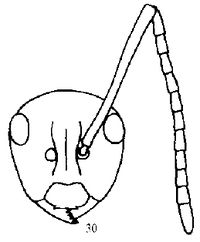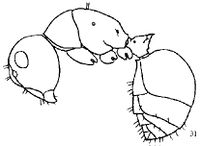Polyrhachis rotoccipita
| Polyrhachis rotoccipita | |
|---|---|

| |
| Scientific classification | |
| Kingdom: | Animalia |
| Phylum: | Arthropoda |
| Class: | Insecta |
| Order: | Hymenoptera |
| Family: | Formicidae |
| Subfamily: | Formicinae |
| Tribe: | Camponotini |
| Genus: | Polyrhachis |
| Subgenus: | Cyrtomyrma |
| Species: | P. rotoccipita |
| Binomial name | |
| Polyrhachis rotoccipita Xu, Z., 2002 | |
The type material was collected from karst monsoon forest, seasonal rain forest and semi-evergreen monsoon forest.
Identification
Xu (2000) - This new species is close to Polyrhachis rastellata, but has black legs; petiolar node with median teeth longer than lateral ones.
Keys including this Species
Distribution
Latitudinal Distribution Pattern
Latitudinal Range: 22.88333333° to 22.88333333°.
| North Temperate |
North Subtropical |
Tropical | South Subtropical |
South Temperate |
- Source: AntMaps
Distribution based on Regional Taxon Lists
Palaearctic Region: China (type locality).
Distribution based on AntMaps
Distribution based on AntWeb specimens
Check data from AntWeb
Countries Occupied
| Number of countries occupied by this species based on AntWiki Regional Taxon Lists. In general, fewer countries occupied indicates a narrower range, while more countries indicates a more widespread species. |

|
Estimated Abundance
| Relative abundance based on number of AntMaps records per species (this species within the purple bar). Fewer records (to the left) indicates a less abundant/encountered species while more records (to the right) indicates more abundant/encountered species. |

|
Biology
Castes
Nomenclature
The following information is derived from Barry Bolton's Online Catalogue of the Ants of the World.
- rotoccipita. Polyrhachis (Cyrtomyrma) rotoccipita Xu, 2002b: 528, figs. 30-33 (w.) CHINA.
Unless otherwise noted the text for the remainder of this section is reported from the publication that includes the original description.
Description
Worker
Holotype. TL 5.3, HL 1.40, HW 1.35, CI 96, SL 1.85, SI 137, PW 1.05, AL 1.75, ED 0.40, MTL 2. 25. Head slightly longer than broad, roughly triangular. Occipital margin roundly convex. occipital corners rounded. Lateral sides evenly convex. Mandibles with 5 teeth. Clypeus evenly convex. without longitudinal central carina, anterior margin with a pair of small denticles and straight between the denticles. Antennae long, scape surpassing occipital corner by about 2/3 of its length. Eyes placed at occipital corners. In profile view, dorsum of alitrunk strongly convex, promesonotal suture distinct, metanotal groove absent. Propodeum unarmed, dorsum and declivity separated by a roundly blunt convex. In dorsal view, shoulders of pronotum rounded. In front view, lateral teeth of petiolar node short and acute, median teeth elongate and slender, spine-like and longer than lateral ones. In profile view, petiolar node triangular, ith median teeth bent backward. Mandibles finely punctured, relatively dull. Head, alitrunk, petiole and gaster with weak micro-reticulation, relatively shiny. The whole body with abundant depressed short pubescence. Anterior portion of head, ventral face and apex of gaster with spares suberect hairs, mesonotum with a pair of erect hairs. Occiput, pronotum, propodeum, petiole and dorsum of first gastral segment without erect hairs. Scapes, femora and tibiae without erect hairs. The whole body black, with blackish blue metallic luster, eyes yellowish brown, legs black. Hairs grayish white.
Paratypes. TL 5.2-5.6, HL 1.40-1.65, HW 1.35-1.55, CI 93-97, SL1.85-2.15, SI 135-146, PW 1.05-1.30, AL 1.75-2.10, ED 0.40-0.45, MTL 2.25- 2.60 (5 measured). As holotype, but in some individuals mesonotum without erect hairs.
Type Material
The type specimens are deposited in the Insect Collections, Faculty of Resources. Southwest Forestry College. Kunming. Yunnan Province, China.
Holotype: worker, No. A97-2836, 830 m, Shihuishan Mountain, Menglun Town, Mengla County, Yunnan Province, IX.16.1997, collected by Dr. Xu Zheng-Hui in karst monsoon forest. Paratypes: 3 workers, with same data as holotype; 5 workers. No. A97-3140, 790 m, Bubang Village, Mengla County, Yunnan Province, XII.13.1997, collected by Mr. Hu Gang in seasonal rain forest; 1 worker. No. A97-1641. 900 m, Manzhuang Village, Mengla County, Yunnan Province, VIII.14.1997, collected by Mr. He Yun-Feng in semi-evergreen monsoon forest; 3 workers, with same data as No. A97-1641, but No. A97-1628; 2 workers, No. A96-728, 750 m, Huihancun Village, Mengla County, Yunnan Province. III.10.1996. collected by Miss Chen Zhi-Ping in seasonal rain forest.
References
- Liu, C., Fischer, G., Hita Garcia, F., Yamane, S., Liu, Q., Peng, Y.Q., Economo, E.P., Guénard, B., Pierce, N.E. 2020. Ants of the Hengduan Mountains: a new altitudinal survey and updated checklist for Yunnan Province highlight an understudied insect biodiversity hotspot. ZooKeys 978, 1–171 (doi:10.3897/zookeys.978.55767).
- Xu, Z.-H. 2002b. A systematic study on the ant subgenus Cyrtomyrma Forel of the genus Polyrhachis Smith of China (Hymenoptera: Formicidae). Acta Entomol. Sin. 45: 522-530 (page 528, figs. 30-33 worker described)
References based on Global Ant Biodiversity Informatics
- Chen Y. Q., Q. Li, Y. L. Chen, Z. X. Lu, X. Y. Zhou. 2011. Ant diversity and bio-indicators in land management of lac insect agroecosystem in Southwestern China. Biodivers. Conserv. 20: 3017-3038.
- Guénard B., and R. R. Dunn. 2012. A checklist of the ants of China. Zootaxa 3558: 1-77.
- Ran H., and S. Y. Zhou. 2013. Checklist of Chinese Ants: Formicomorph Subfamilies ( Hymenoptera: Formicidae) (III). Journal of Guangxi Normal University : Natural Science Edition 31(1): 104-111.
- Song Y., Z. Xu, C. Li, N. Zhang, L. Zhang, H. Jiang, and F. Mo. 2013. An Analysis on the Ant Fauna of the Nangun river Nature Reserve in Yunnan, China. Forest Research 26(6): 773-780.
- Xu Z. H. 2002. A systematic study on the ant subgenus Cyrtomyrma Forel of the genus Polyrhachis Smith of China (Hymenoptera; Formicidae). Acta Entomologica Sinica 45(4): 522-530.
- Xu Zheng-Hui. 2002. A systematic study on the ant subgenus Cyrtomyrma Forel of the genus Polyrhachis Smith of China (Hymenoptera; Formicidae). Acta Entomologica Sinica 45(4): 522-530.

